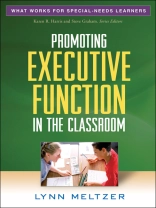Accessible and practical, this book helps teachers incorporate executive function processes—such as planning, organizing, prioritizing, and self-checking—into the classroom curriculum. Chapters provide effective strategies for optimizing what K–12 students learn by improving how they learn. Noted authority Lynn Meltzer and her research associates present a wealth of easy-to-implement assessment tools, teaching techniques and activities, and planning aids. Featuring numerous whole-class ideas and suggestions, the book also shows how to differentiate instruction for students with learning or attention difficulties. Case examples illustrate individualized teaching strategies and classroom accommodations. More than a dozen reproducibles are included; the large-size format facilitates photocopying and day-to-day reference. Purchasers also get access to a Web page where they can download and print the reproducible materials. See also Meltzer’s edited volume, Executive Function in Education, Second Edition, which presents state-of-the-art knowledge on the role of EF in learning across the content areas.
表中的内容
I. Understanding Executive Function: The Challenge for 21st-Century Teachers 1. Understanding, Assessing, and Teaching Executive Function Processes: The Why, What, and How, Lynn Meltzer2. Creating a Classroomwide Executive Function Culture That Fosters Strategy Use, Motivation, and Resilience, Lynn Meltzer and Surina Basho II. Scaffolding Executive Function Processes into the Curriculum Content3. Goal Setting, Planning, and Prioritizing: The Foundations of Effective Learning, Kalyani Krishnan, Melissa J. Feller, and Melissa Orkin4. Organizing: The Heart of Efficient and Successful Learning, Kalyani Krishnan and Melissa J. Feller5. Remembering: Teaching Students How to Retain and Mentally Manipulate Information, Donna M. Kincaid and Nancy Trautman6. Shifting and Flexible Problem Solving: The Anchors for Academic and Life Success, Lynn Meltzer and Jennifer Sage Bagnato7. Self-Monitoring and Self-Checking: The Cornerstones of Independent Learning, Jennifer Sage Bagnato and Lynn Meltzer8. Emotional Self-Regulation: A Critical Component of Executive Function, Judith A. Stein III. Case Studies: Addressing Executive Function Weaknesses across the Grades, Lena Hannus-Suksi, Laura Sales Pollica, Wendy Stacey, Melissa J. Feller, and Jason Bendezu Appendix: Reproducibles for the Classroom
关于作者
Lynn Meltzer, Ph D, is President and Director of the Institutes for Learning and Development (Research ILD and ILD) in Lexington, Massachusetts. She is also an Associate in Education at the Harvard Graduate School of Education and a Fellow and past president of the International Academy for Research in Learning Disabilities. For 29 years, she was Adjunct Associate Professor in the Department of Child Development at Tufts University. Dr. Meltzer is founder and chair of the International Learning Differences Conference, which was established in 1984 and is held at the Harvard Graduate School of Education. Her 40 years of neuropsychological evaluations and clinical consultations with children, adolescents, and adults have emphasized the theory-to-practice cycle of knowledge. She has been an invited speaker at numerous national and international conferences, including that of the International Association for Cognitive Education in Southern Africa. She is also the recipient of numerous awards, including the Outstanding Researcher Award from the Council for Learning Disabilities. Among Dr. Meltzer’s extensive publications and presentations are the books Promoting Executive Function in the Classroom, The Power of Peers in the Classroom (coedited with Karen R. Harris), and Executive Function in Education, Second Edition. Together with her Research ILD colleagues, she developed SMARTS Online, an evidence-based executive function and peer mentoring/coaching curriculum for middle and high school students (www.smarts-ef.org).












